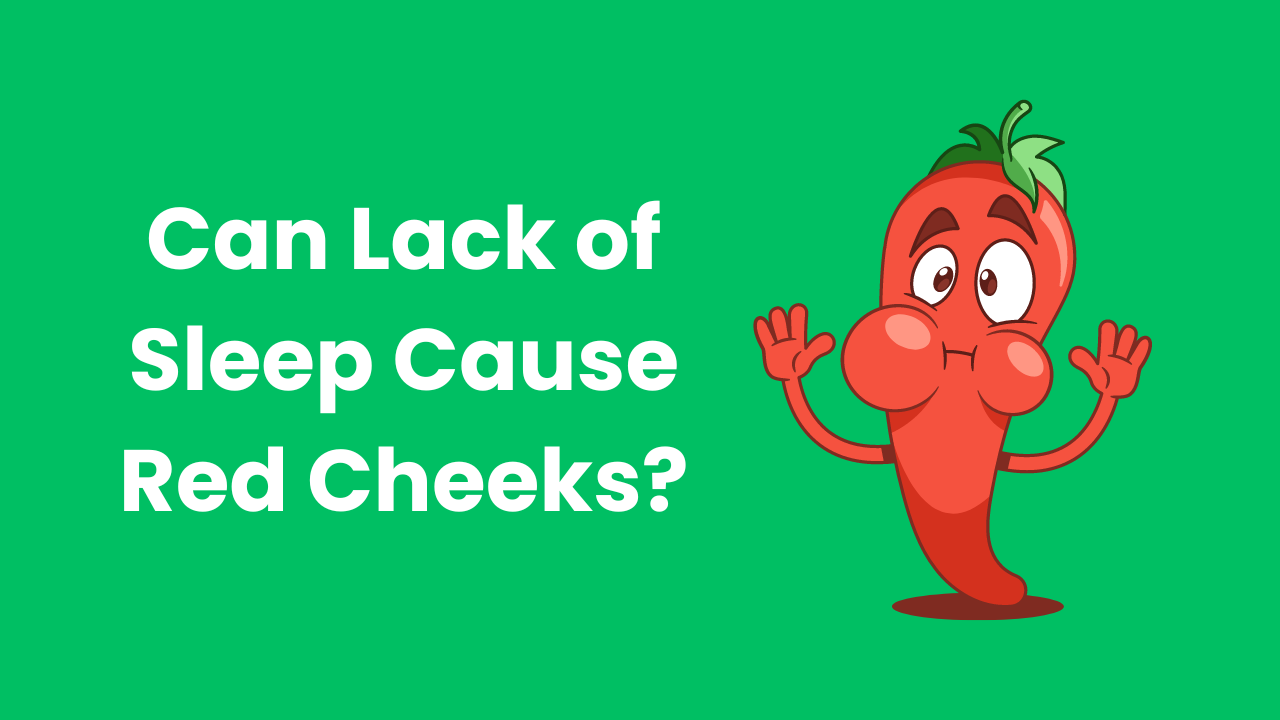Introduction:
Sleep often takes a backseat in the hustle and bustle of modern life, and its impact on our health is undeniable. One curious question that often surfaces is whether the lack of sleep can lead to red cheeks. Let’s delve into the nuances of this phenomenon to understand if there’s a connection between sleep deprivation and rosy cheeks.
1.1: The Physiology of Cheek Redness:
Before exploring the link between sleep and red cheeks, one must grasp what causes them to turn red. The color of our cheeks is primarily attributed to blood flow and tiny blood vessels close to the skin’s surface.
1.2: The Sleep-Red Cheeks Connection:
1. Blood Circulation and Sleep Quality:
One aspect to consider is how sleep, or the lack thereof, influences blood circulation. Quality sleep is associated with improved circulation, ensuring an adequate oxygen supply and nutrients to the skin. Conversely, insufficient sleep might compromise circulation, potentially impacting the appearance of your cheeks.
2. Inflammation and Sleep Deprivation:
Lack of sleep is known to trigger inflammation in the body. Inflammation can affect the skin’s health, leading to redness and increased blood flow to the facial area. This inflammatory response might contribute to rosy cheeks in individuals experiencing chronic sleep deprivation.
1.3: Addressing Common Misconceptions:
1. Alcohol and Red Cheeks:
It’s crucial to differentiate between the effects of alcohol consumption and sleep. While alcohol can cause facial redness, especially in individuals with alcohol intolerance, the focus here is on the specific relationship between sleep patterns and cheek coloration.
2. Skin Conditions and Redness:
Certain skin conditions, such as rosacea, can result in persistent redness on the face. It’s essential to distinguish between pre-existing skin conditions and temporary redness linked to sleep patterns.
1.4: Tips for Healthy Sleep and Radiant Skin:
1. Prioritize Quality Sleep:
Make a conscious effort to prioritize quality sleep. Establish a consistent sleep schedule, create a comfortable sleep environment, and minimize disruptions to enhance the overall quality of your rest.
2. Hydration and Skincare:
Adequate hydration and a proper skincare routine can play a pivotal role in maintaining skin health. Well-moisturized skin is less likely to appear red or irritated.
3. Manage Stress:
Stress can negatively impact both sleep and skin health. Incorporate stress management techniques, such as meditation or deep breathing exercises, into your daily routine to promote overall well-being.
Conclusion:
While the direct link between lack of sleep and red cheeks may not be universally agreed upon, there are plausible connections worth exploring. Understanding the intricate relationship between sleep, blood circulation, and skin health can empower individuals to make informed lifestyle choices for a more radiant complexion.
In the quest for healthier skin, a holistic approach that combines good sleep hygiene with skincare practices can be the key to achieving that coveted natural glow. Remember, the journey to more transparent, rosy cheeks often involves a balance of various factors, with quality sleep being a vital component in the puzzle.
FAQ
1Q: Can lack of sleep directly cause red cheeks, or is it a temporary effect?
The relationship between lack of sleep and red cheeks is complex. While temporary effects like increased blood flow due to poor circulation may contribute, it’s essential to consider other factors like skin conditions and overall skin health.
2Q: Are there specific skincare routines that can help alleviate redness caused by lack of sleep?
Yes, maintaining a proper skincare routine, including hydration and moisturization, can mitigate the impact of poor sleep on your skin. However, addressing the root cause by improving sleep quality is crucial for long-term results.
3Q: Does alcohol consumption play a role in the redness of cheeks, and how does it relate to sleep patterns?
While alcohol can contribute to facial redness, it’s distinct from the effects of sleep deprivation. Understanding the specific impact of each factor is essential for accurate analysis.
4Q: Can stress contribute to sleep deprivation and red cheeks, and how can it be managed effectively?
Stress is a multifaceted factor influencing sleep quality and skin health. Managing stress through meditation and deep breathing can positively impact overall well-being.
5Q: Are there long-term consequences of chronic sleep deprivation on skin health, and can they be reversed?
Chronic sleep deprivation can contribute to skin issues, including redness. While adopting healthier sleep habits and skincare routines can improve skin health, addressing long-term consequences may require a comprehensive lifestyle approach.
Help From Chatgpt 4





Hey, cool post There is an issue with your website in Internet Explorer; could you please check this? Because of this issue, many people will overlook your excellent article because IE is still the most used browser.
Just wish to say your article is as surprising The clearness in your post is just cool and i could assume youre an expert on this subject Fine with your permission allow me to grab your RSS feed to keep updated with forthcoming post Thanks a million and please keep up the enjoyable work
Thank you for the good writeup It in fact was a amusement account it Look advanced to far added agreeable from you However how could we communicate